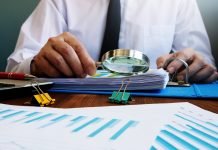

We can debate — if you want — whether the newly created Consumer Financial Protection Bureau was necessary. (I think it was.) But there is absolutely no doubt that its director Richard Cordray has hit on a huge — but mostly overlooked — public policy problem.
I’ll let him explain.
“We must start with the importance of fostering broader recognition that educational and informational support in matters of personal finance are essential pillars of life as we know it in America,” is the way Cordray began his speech at the Federal Reserve of Chicago, VISA Inc. Financial Literacy and Education Summit on April 17th.
In other words, we have to do a much better job of making sure people understand the basics of personal finance.
One of the many, many reasons we are still working our way through the worst financial crisis since the Great Depression is, Cordray said, because when people were “faced with the growing complexity of financial decisions around mortgages and other household credit,[they] were poorly equipped to deal with that complexity by making sound and sensible decisions.
And that is just wrong.
“We have chosen, both in our Constitution and in our practical institutions, to rest our democratic system on the effective operation of a free market economy,” he said. “That arrangement demands a certain capability from our population, not only in political affairs but in financial affairs as well. And education is the cornerstone for attaining that capability. Just as each citizen is entitled to vote and to participate on an equal footing in our civic life, each is also expected and required to manage his or her own financial affairs.
“The freedom and liberty that we cherish to direct our own lives depends critically on being able to manage the ways and means of our lives. Once we cease being someone else’s dependent, we gain the status of being fully independent, on our own, and we carry all the burdens of economic self-government. If we intend to foster and maintain the kind of society we desire to have, then we must make a point to arm our fellow citizens with the wherewithal to stand on their own two feet and make sustainable economic choices.”
To do that, he makes three recommendations that I particularly like.
“First, we must be deliberate about pursuing financial education in our schools. Failing to do so is to condemn boys and girls to make the same mistakes others have made before them by enrolling them in the ‘school of hard knocks,’ which we all know is no school at all. It is the antithesis of education for each generation to have to learn the same lessons all over again and on their own. This will not do: When we do not teach children about personal finance–about managing household budgets or making informed decisions about larger investments in an education or a home–we are failing them in a very shameful and costly way.
“Second, everyone who examines these issues can see, we need to have financial education start early and be continuous. The key to lifelong learning is to be self-conscious about keeping these matters top-of-mind for students. We need to develop integrated curricula in our schools – where the benefits of compound interest are understood in math class; where economic costs and risks are taught in social studies class; and where essays in English class include the topic of money: what it is, how we use it, how we keep it safe, and so forth. None of this distracts from the classroom agenda; in fact, children pay more attention to things that interest them. And when it comes to money, kids “get it” – they view money as fascinating and important.
“Third, as young people approach the magic threshold of adulthood, I believe we need to require them to spend some time and attention on what this independence will mean from a financial standpoint. The question becomes immediate and insistent: How can we take control of our financial lives to achieve our goals? We all need to know why we have bank accounts, why we keep track of checking account balances, why we should check our credit reports regularly. We also know how important it is for students to practice, through experiential learning, how to manage their finances. So, financial education in our high schools should include practical experience, and it should not be an option that many students can and will avoid.”
Far too often “I am from the government and I am here to help,” serves as a punch line. If Cordray is able to accomplish what he has vowed to do, this will be one place happily it will not.
What do you think?
Originally published on Forbes.com









